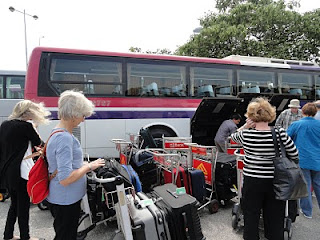Article by Nancy TrejosThe Washington Post-
From charities to tour companies and luxury hotels, there's no shortage of nonprofits and for-profits willing to organize a volunteer trip for the altruistic - and paying traveler. For good reason: nearly one in 20 U.S. travelers has taken a trip to help the less fortunate or support a humanitarian cause, according to research firm Y Partnership's 2009 National Leisure Travel Monitor.
"Voluntourism" has grown in popularity since the Sept. 11, 2001, terrorist attacks and the destruction of the Gulf Coast by Hurricane Katrina in 2005. Experts cite another reason for its ascent: It's trendy. Think Angelina Jolie touring refugee camps in Darfur.
"There's just much more interest in reaching out and helping people in poverty," said Genevieve Brown, executive director of the International Volunteer Programs Association, a group of nongovernmental organizations involved in volunteer work.
Voluntourism usually works best when the volunteer contributes to a well-organized project while interacting with other volunteers and local residents. But sometimes volunteers don't have a fulfilling experience. Worse, sometimes they harm, not help, the community.
For instance, some voluntourism experts advise against volunteering at an orphanage, because the already vunerable children can get too attached to someone who won't stick around. Others say volunteers should make sure they aren't taking jobs away from locals. "Any project can be harmful to the community if it's done wrong," said Zahara Heckscher, co-author of "How to Live Your Dream of Volunteering Overseas."
With so many voluntourism opportunities out there, and so much that can go awry, how's a traveler to choose?
David Clemmons, founder of VolunTourism.org, said potential voluntourtists should first carefully consider their motivation. Anyone doing it just for school credit (some programs offer courses) would probably be better off getting a summer job.
Anyone doing it simply to write off a vacation probably shouldn't be a voluntourist at all, Clemmons said. (Some U.S. voluntourists may seek a tax deduction if they pay fees to a U.S. nonprofit organization and if they spend most of their time working. But it depends on the organization and the specific trip, so volunteers should consult a licensed accountant.)
Prospective volunteers should assess their skills to figure out what they can offer. There are many types of volunteer opportunities: educational, environment, research-oriented, humanitarian, cultural. Volunteers should decide what kind of work they want to do and what they're qualified to do. Setting realistic goals is important.
Ask practical questions: Where do you want to go? What kind of accommodations will you tolerate? Are you willing to live with other volunteers or a local family, or do you want to stay at a hotel? Are you a picky eater, or can you handle the local food? How much time do you want to spend volunteering versus sightseeing? How long can you volunteer?
Once practical concerns are addressed, choose an organization. If you've decided on a nonprofit that does nothing but coordinate trips, do more digging: Interview someone who works for the group and try to contact past volunteers. Make sure you share the organizations values, as some have overtly religious or political views.
Find out wether the organization is running the program in the community you are being sent to or wether it's simply matching you with a local organization. While you shouldn't automatically stay away from every organization that acts as what Clemmons calls a "pass-through," you do run some risks.
"At the end of the day, it's difficult for you to have any kind of recourse because, really, there's a disconnect between a pass-through organization and the on-the-ground organization," he said.
Prices run the gamut from hundreds to thousands of dollars. Ask what the fee covers. Some organizations cover only housing and food; you pay for airfare, ground transportation and other expenses.
Other will include transportation to and from the airport, supplies, liability insurance, evacuation insurance and more. Some include a donation to the community in the price.
















